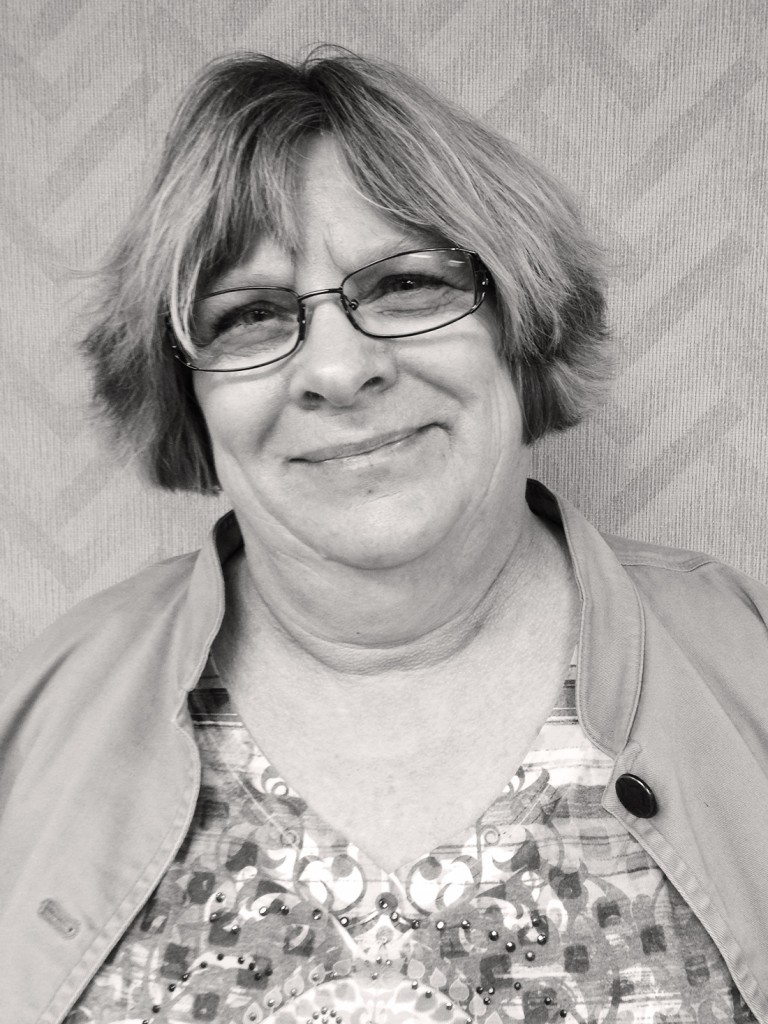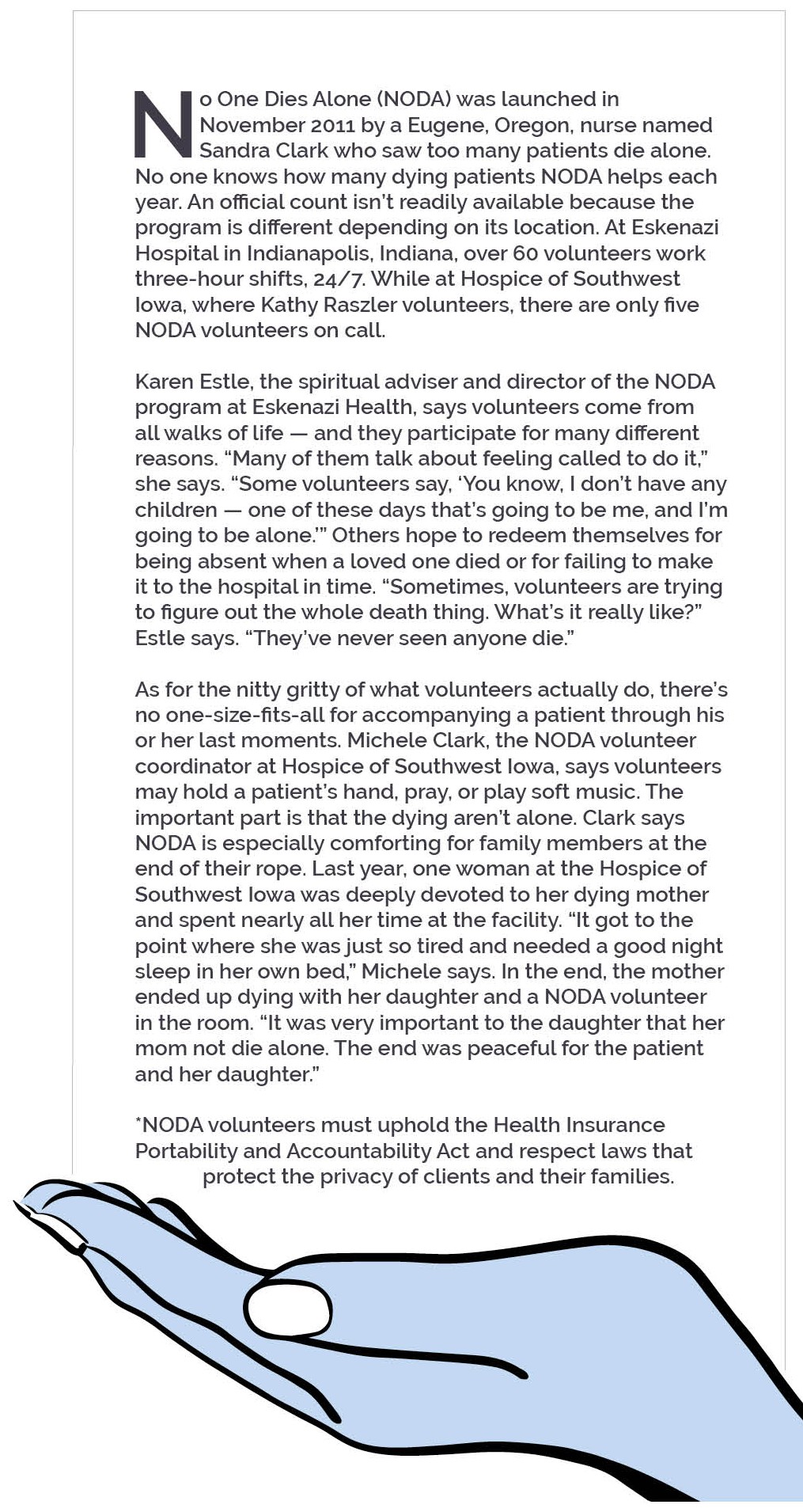Kathy Raszler is 250 miles away from home in Council Bluffs, Iowa. And she’s been there for almost four weeks. The reason: When her friend Bob’s checkup with the doctor turned into a double knee surgery and recovery, Kathy stayed. Because a year ago, the day she met Bob, she said she would.

Twenty-five years earlier, Kathy’s sister performed CPR on Bob’s son after he jumped into a too-shallow lake and endured a near-fatal head injury. When Bob’s son passed last year, Kathy and Bob crossed paths — “and he said he needed new knees and such,” Kathy remembers. “And I said, well, if the opportunity comes, perhaps I could be a part of that.”
Bob, who prefers to be identified by his first name only, says Kathy is fiercely independent. “It was her own decision to want to stick it out through the whole thing,” he says. And she did. For four weeks, she iced his knees, took him to appointments, and handled all the driving. And she did it all willingly.
“Willingness is so rare these days,” Bob says. “If somebody says, ‘How’d you like to take three weeks off and be my personal slave?’ you’re not going to get many responses. So she’s different in that regard.”
For 65- year-old Kathy, this is nothing but the usual. After her own experiences with tragedy and hospital walls, she’s made it her personal mission to help as many people as possible through pain and trying times. And she’s in it for the long haul, sometimes spending years with bed-ridden patients in need of good company and with families in need of support. She works as a volunteer with No One Dies Alone (NODA), an organization that shares her commitment to comforting those in need (see sidebar). Some of those she cares for, like Bob, recover quickly. Others: She sees them through to the end.
And they’ve all taught her something. Most importantly: That it’s not about what the volunteers do. “A person doesn’t have to say anything,” she says. “Sometimes just being a presence is sufficient.”
Always a Caretaker
At 45, Kathy married her second husband, Harlen. Eleven months later Harlen was diagnosed with prostate cancer. He died five years later. He was buried on Valentine’s Day.

It was this loss that pushed Kathy towards being a witness. Just weeks before Harlen’s death, a social worker at the Nebraska Medical Center told Harlen and Kathy something that would change everything: “You know, Harlen,” she said, “you don’t have to do this anymore.” And so, instead of suffering more through chemotherapy, Harlen and Kathy decided he would be placed in hospice. He spent the last three weeks of his life at home, in the company of family instead of in a hospital room.
After Harlen’s death, Kathy became a passionate advocate for hospice care. After Kathy heard of NODA — which aids patients both in hospitals and in their homes — joining the organization was an obvious choice. “I knew that when Harlen passed, family was all around, and it was so important,” she said. “So [I heard] they had this group called NODA, and I wanted to be a part of that.”

NODA is one part of Kathy’s personal mission to be present for the hurting and dying. Since she retired in 2010, it’s practically turned into a full-time job. “I knew I needed to do something outside of myself, outside of my box,” Kathy says. She visits hospice patients to allow their families or caregivers a little respite. She regularly spends the night at the hospital when friends, like Bob, go through procedures and don’t have family to stay with them. “Family’s so important,” she says. “Not everybody has that.”

Caring for Everyone
Kathy can’t mention any names for legal reasons. As a NODA volunteer, she must uphold the Health Insurance Portability and Accountability Act and respect laws that protect the privacy of her clients and their families. But she can tell stories. Like one instance when she started volunteering. Her first client was in hospice. She sat with a woman for three years, every Tuesday from 11:30 a.m. to 4:30 or 5 p.m. She gave the woman’s husband the freedom to get out of the house and do what he needed to, and, with Kathy there, he wouldn’t lose any peace of mind. When Kathy volunteers, it’s not just for the patients — it’s for their families, too.
Kathy says NODA allows the family of a dying patient to have great comfort in knowing they can take a nap, go for a walk, go to the store, and their loved one won’t be abandoned. “When she was passing,” Kathy says, “I stopped at the house every day for a week, just to see how she was doing because you become a part of that family.”
Before going to pick up Bob from his physical therapy session, she mentions making plans to catch up with the daughter of another patient she sat with during the patient’s last days. Her care and compassion doesn’t end when a patient dies, because Kathy doesn’t just care for the dying.
“We all want to be loved,” she says. “That’s part of all this, too. It’s giving of yourself and getting out of yourself. It’s being able to share with others.”

